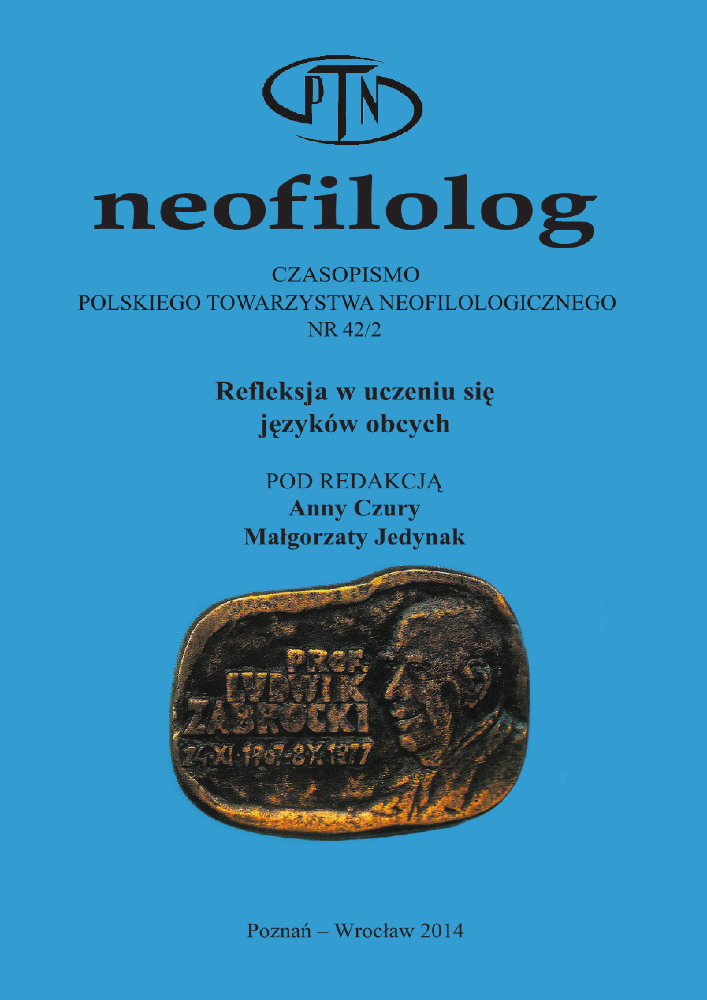Abstract
The Common European Framework of Reference for Languages is a document characterized by a high level of generality, addressed to a wide range of readers. The conceptual paradigm included in the document could constitute the basis for a new trend in language didactics; however, a lot of further work and research should be carried out for the new approach to achieve the status of independent and efficient methodology. The first prerequisite for introducing necessary modifications is a reflexive approach to the recommendations of CEFR, especially those which are methodological in character. The lack of any rules or procedures showing how to facilitate the achievement of learning objectives is the most frequent objection made against the CEFR. The focus on what has to be taught should go along with how to teach and why. Reflexivity which occupies a marginal position in the CEFR has to become a priority for its users if the methodology outlined there is to constitute the new era in language didactics.References
Beacco, J.-C. 2007. L’approche par compétences dans l’enseignement des langues: enseigner à partir du Cadre européen de référence pour les langues. Paris: Didier.
Bronckart, J.-P., Bulea, E. 2005. „Coda: pour une approche dynamique des compétences (langagières)” (w:) Repenser l’enseignement des langues: comment identifier et exploiter les compétences (red. J.-P. Bronckart, E. Bulea, M. Pouliot). Lille: Presses Universitaires du Septentrion: 193-222.
Castellotti, V. 2002. „Qui a peur de la notion de compétence?” (w:) La notion de compétence en langue – Notions en questions 6 (red. V. Castellotti, B. Py). Lyon: E. N. S. Editions: 9-16.
Janowska, I. 2011. Podejście zadaniowe do nauczania i ucznia się języków obcych. Na przykładzie języka polskiego jako obcego. Kraków: Universitas.
Le Boterf, G. 2010. Construire les compétences individuelles et collectives. Paris: Groupe Eyrolles.
Perrenoud, Ph. 2011. Quand l’école prétend préparer à la vie... – Développer des compétences ou enseigner d’autres savoirs. Paris: ESF Editeur.
Rada Europy. 2003. Europejski system opisu kształcenia językowego: uczenie się, nauczanie, ocenianie. Warszawa: Wydawnictwa CODN.
Richer, J.-J. 2012. La didactique des langues interrogée par les compétences. Fernelmont: E. M. E. & InterCommunications.
Rosen, E. 2006. Le point sur le Cadre européen commun de référence pour les langues. Paris: CLE International.
License
Copyright (c) 2019 Neofilolog

This work is licensed under a Creative Commons Attribution-NoDerivatives 4.0 International License.
Authors
Authors of texts accepted for publication in Neofilolog are required to complete, sign and return to the Editorial team’s office the Agreement for granting a royalty-free license to works with a commitment to grant a CC sub-license.
Under the agreement, the authors of the texts published in Neofilolog grant Adam Mickiewicz University in Poznań a non-exclusive, royalty-free license and authorize the use of Attribution-NoDerivatives 4.0 International (CC BY-ND 4.0) Creative Commons sub-license.
The authors retain the right to the free disposal of the work.
Users
Interested Internet users are entitled to use works that have been published in Neofilolog since 2017, under the following conditions:
▪ attribution – obligation to provide, together with the distributed work, information about the authorship, title, source (link to the original work, DOI) and the license itself.
▪ no derivatives – the work must be preserved in its original form. Without the author's consent, it is not possible to distribute the modified work in the form of translations, publications, etc.
Copyrights are reserved for all texts published since 2017.
Miscellaneous
Adam Mickiewicz University in Poznań retains the property right as a whole (layout, graphic form, title, cover design, logo etc.).
